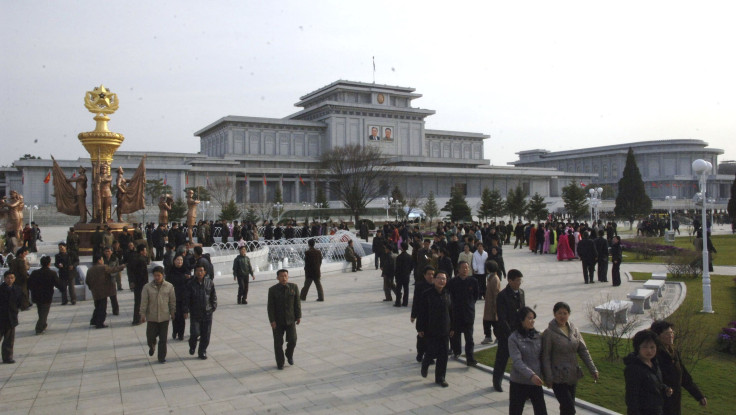Did BBC Use LSE Students As ‘Human Shields’ During Undercover North Korea Trip?

Did the BBC dupe a group of students from the London School of Economics and use them as “human shields” for a covert reporting trip to North Korea?
The preeminent academic institution thinks so. It has accused the BBC of putting LSE students at risk by secretly embedding three TV journalists in a school trip to the hermitic communist state in March to shoot a Panorama documentary, which aired Monday night amid growing tensions on the Korean peninsula and bellicose threats of nuclear war.
The London School of Economics students would have been in grave danger if North Korean authorities had uncovered the journalists’ deception, the LSE believes.
Alex Peters-Day, general secretary of the LSE Students' Union, said the BBC "used students essentially as a human shield.”
Journalists cannot, under most circumstances, obtain visas to visit North Korea, but students and academics can.
In covert footage from the trip, BBC reporter John Sweeney is seen walking through the countryside near Pyongyang without any government minders present. Other excerpts reveal him touring a bottling plant, a farm and a hospital.
The BBC claims the decision to embed Sweeney “went right to the top” of the chain, and that all 10 students, aged 21 to 28, who traveled to North Korea between March 23 and March 30 were told “a journalist” would be with them. None, however, were told a three-man team, including the prominent BBC personality, would be there. Sweeney himself posed as an LSE PhD student.
“I told a lie,” he said on BBC News Sunday night. “It’s difficult. However, we are getting into a state, which, frankly, is more like Hitler’s Germany than any other state in this world right now. It is extraordinarily scary, dark and evil. All of the students on that trip could have, if you like, dogged me in. None of them did.”
Sweeney said the majority of the students supported the program, but LSE newspaper The Beaver quoted an anonymous student who went with him to North Korea as saying the group was “not made aware of the presence of several BBC journalists at the time of the flight to Pyongyang.”
“We were led to believe that John Sweeney was a history professor, although it was later implied that he was not a professor at LSE.”
How to report on North Korea to the outside world remains a tricky subject full of ethical quandaries for journalists. Sweeney, for his part, believes the BBC acted in the public’s interest, and that “the less the students knew, the better.” Others see things quite differently.
The Royal Society and British Academy, which represent sciences and humanities respectively, issued a joint statement claiming Panorama put at risk “the credibility and security of U.K. academics working overseas in highly sensitive circumstances.”
LSE sent a blistering email to all students and staff on April 13 about the North Korea trip, alerting them of “serious developments which may affect them personally in the future.”
“The School authorities had no advance knowledge of the trip or of its planning,” LSE said. “At no point prior to the trip was it made clear to the students that a BBC team of three had planned to use the trip as cover for a major documentary to be shown on Panorama.”
As the email suggests, the entire episode is rather messy. While the trip to North Korea was filled with LSE students, it was organized not by the school but rather a group of people including Sweeney’s wife, Tomiko Newson, who lectures at LSE and, incidentally, provided an exclusive glimpse into North Korea for the Independent last year. The trip was promoted in the name of the Grimshaw International Relations Club, a student society at LSE, though the organization has since distanced itself from the trip in numerous posts on its Facebook page.
LSE believes Sweeney put the students at risk of encountering the same abuses he was in North Korea to chronicle.
“It is LSE’s view that the students were not given enough information to enable informed consent, yet were given enough to put them in serious danger if the subterfuge had been uncovered prior to their departure from North Korea.”
The school also claims Sweeney not only described himself as an LSE PhD student in history to border authorities but also gave the actual office room number of a genuine member of the LSE staff.
The university believes all of its academic research in sensitive parts of the world is now in jeopardy.
“The BBC’s actions may do serious damage to LSE’s reputation for academic integrity and may have seriously compromised the future ability of LSE students and staff to undertake legitimate study of North Korea, and very possibly of other countries where suspicion of independent academic work runs high,” the university said.
Some involved in the trip have already found themselves targeted by Pyongyang.
“We have received complaints from North Korean authorities -- and some of the students who went on the trip have received threats,” LSE director Craig Calhoun told the Guardian.
Calhoun said other students had been advised to cancel foreign trips over the summer as a result of the international row.
LSE asked the BBC to cancel the program over fears of possible retribution if the students’ identities were to be reveled. The BBC declined, though it did agree to blur the students’ faces. The report, "North Korea Uncovered," aired as scheduled on BBC 1 at 8:30 p.m. Monday night. Many critics found it to be lacking in any new information that would be of "public interest."
© Copyright IBTimes 2024. All rights reserved.






















